“Peace, be still” (Mark 4:39)
These were the exact words of Jesus when his disciples called upon him.
As they traveled through the sea, a great wind came upon them.
Jesus was asleep and wasn’t bothered about the storm.
But his disciples were afraid.
They panicked among themselves, believing that they would die.
As the storm continued to beat their boat, things got even worse.
The ship began to sink as water swamped their boat.
AT this point, fear gripped their minds.
As they turned to Jesus, he was still asleep in the boat.
Quickly, they ran to Jesus and said, “Teacher, don’t you care if we drown?”
Immediately, Jesus stood up and rebuked the wind by saying, “Quiet! Be still!” (NIV)
This passage of the bible is essential to strengthen our faith when we think we have lost hope.
Life can be unbearable at times, but in such circumstances, we must trust in God.
There is a lot to learn from how Jesus and his disciples reacted (more on that later).
Thankfully, there are similar peace be still scriptures that can encourage us in our trials.
Remember, the devil aims to kill and destroy.
He moves aimlessly, searching for the righteous to persecute.
But when we are tempted, we must return to God.
We must put on the amour of God and trust in his power to save us.
I have put together peace be still bible verses to inspire you today.
Recommended for you
- A powerful prayer for peace
- Prayer for peace & Unity in the world
- 25 Bible verses about Peace of mind in tough times
- Peace and Comfort: 31 Powerful Scriptures.
Peace Be Still Bible Verses
Mark 4:39
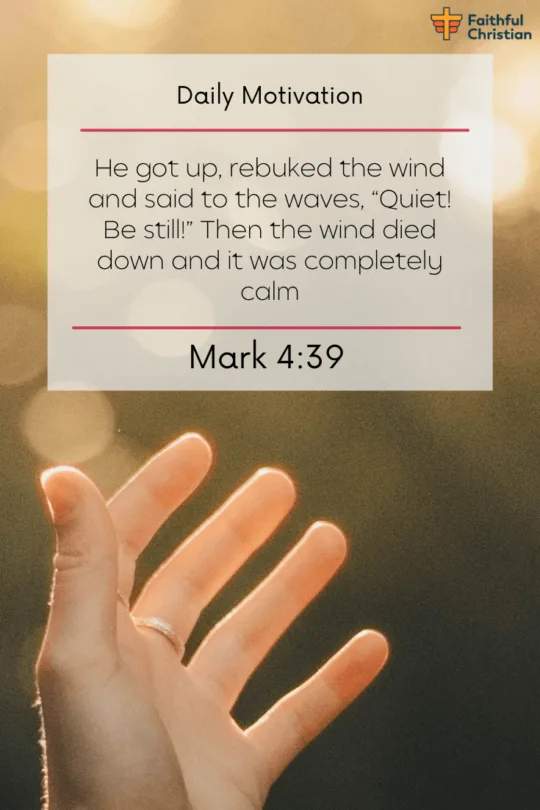
He got up, rebuked the wind and said to the waves, “Quiet! Be still!” Then the wind died down and it was completely calm
Can you imagine being tossed on a turbulent sea? The disciples experienced this in Mark 4:39. Fear gripped them as the storm intensified. Suddenly, Jesus spoke, “Peace, be still!” And miraculously, the tempest yielded to tranquility. This compelling account teaches profound life lessons.
Life storms appear in diverse forms – health issues, financial troubles, shattered relationships. These trials often evoke a feeling of drowning, much like the disciples.
However, a vital truth stands: the same Jesus who calmed the storm offers us His peace amidst our personal trials. His command, “Peace, be still,” resonates in our hearts, promising serenity in the midst of chaos.
Faith is a beacon in adversity. Fear had blurred the disciples’ faith in the storm, even though they’d witnessed Jesus’s miracles. Amid their panic, they overlooked the true identity of their companion.
Through calming the storm, Jesus demonstrated His supreme authority over chaos and reinforced His call for faith amidst adversity.
Personally, I’ve experienced the power of this faith. Battling anxiety, my mind felt like a whirlwind. I felt cornered, defeated. But recalling the Sea of Galilee’s story, I turned to prayer and meditation.
As I focused on Jesus’s promises, my mental storm began to subside. The divine whisper of “Peace, be still” stilled the storm within me. And I understood – truly understood – the power of inviting Jesus into my boat, into my storm.
In Matthew 8:26, Jesus challenges the disciples, “Why are you so afraid? Have you still no faith?” His question persists for us today. It reminds us of our propensity to allow fear to overshadow faith.
Yet, we need not succumb to fear. Like the one battling depression or anxiety, we can summon faith and call out to Jesus for His peace. We can invite Him into our storms and experience His calming presence.
In your tempests, remember Jesus’s authority over chaos. Remember His words, “Peace, be still.” As you invite Him into your storm, His peace will permeate your situation. I assure you, He will calm your storm.
Psalm 107:29
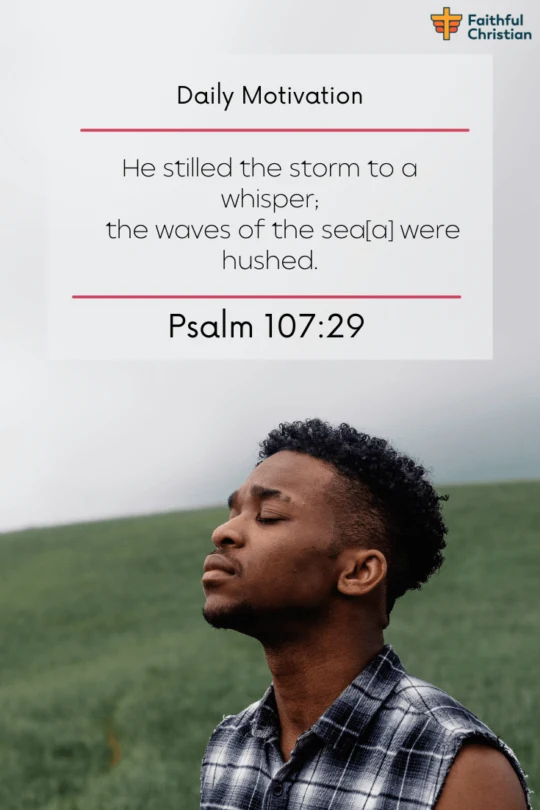
He stilled the storm to a whisper;
the waves of the sea[a] were hushed.
When we reflect on Psalm 107:29, “He stilled the storm to a whisper; the waves of the sea were hushed,” we uncover a powerful metaphor. This verse beautifully embodies God’s power to restore peace.
Consider the biblical narrative of Jonah. Inside a giant fish and amidst a violent sea, Jonah discovered tranquility. He repented, finding spiritual calm despite his chaotic surroundings. This tale symbolizes our ability to find peace even in life’s fiercest storms.
In real life, we can draw a parallel with a community recovering from a natural disaster. Destruction is everywhere, but when the storm subsides, a transformation occurs. People unite, helping each other to rebuild.
Out of devastation emerges unity and shared purpose. This experience mirrors the peace in Psalm 107:29, a testament to our reliance on divine intervention in troubled times.
God’s omnipotence is striking in this verse. The storm, a formidable force of nature, obeys His command and hushes to a whisper.
This demonstration of divine power assures us of His control over our problems, no matter how vast or unmanageable. He is our guide, leading us from distress to tranquility.
The peace that God brings prompts awe and gratitude in us. The disciples in Matthew 8:27 marveled at Jesus calming the storm.
Similarly, the sailors in Jonah 1:15-16 were moved to fear and reverence when the tempest ceased. These reactions deepen our faith and draw us closer to God.
In conclusion, life is riddled with storms—moments of turmoil and anxiety. But Psalm 107:29 reveals an essential truth: no storm is too vast for God to calm. His peace is our refuge, a serene stillness within life’s tempests.
In trusting His omnipotence and steadfast love, we find our peace.
Psalm 65:7

who stilled the roaring of the seas,
the roaring of their waves,
and the turmoil of the nations.
Within the sacred passages of the Bible lies a verse of majestic importance – Psalm 65:7. It states, “Who stilleth the roaring of the seas, the roaring of their waves, and the tumult of the people.”
This verse invokes a portrait of God’s profound control. This control isn’t limited to physical elements but reaches into personal lives as well.
The scripture first highlights God’s authority over chaos. Seas, with their daunting waves, symbolize life’s turbulence. Job 26:12 parallels this, emphasizing God’s dominion over disorder.
Our Exodus tale reflects this vividly. Visualize the Israelites on the Red Sea brink, their hearts throbbing. The Egyptian army looms large, and ahead, the sea roars.
Amid this chaos, God intervenes. He parts the sea, silences the waves, and carves a path to safety. Post this divine intervention, they find peace. This realization rings true with Isaiah 51:15, where God confirms His promise.
This example unravels Psalm 65:7’s relevance for personal tranquility. As the Israelites found peace in the Red Sea’s silence, we can find calm in our personal tumult. Irrespective of the chaos scale, God’s authority promises peace, a tranquil oasis amidst the turmoil.
Let’s consider a real-world scenario. Imagine a political leader tasked with resolving a conflict. The task appears as chaotic as a stormy sea.
However, through astute decisions and strategic negotiation, calm prevails. This instance shows how God’s divine order can cut through human chaos.
Exploring this, the link between God’s authority and our peace becomes evident. Once we accept that the God who tames the seas manages our lives, peace follows. It’s like giving our life’s wheel to a skilled driver. We can then relax, knowing we’re in safe hands.
In summary, Psalm 65:7 offers a comforting image of divine order in human chaos. It reminds us of the peace promise in life’s chaotic moments. No matter how turbulent our seas, we can find solace in God’s control.
So, next time you find your peace disturbed, remember Psalm 65:7. Recall the Red Sea parting and peaceful conflict resolutions. I assure you, you’ll find the courage to whisper, “Peace, be still.”
Psalm 89:9
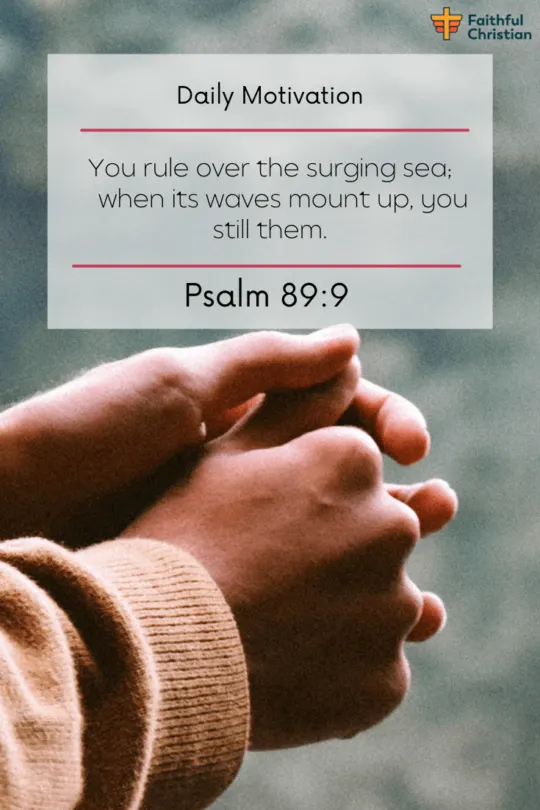
You rule over the surging sea;
when its waves mount up, you still them.
In the mighty seas’ chaos, Psalm 89:9 offers solace. It reads, “You rule over the surging sea; when its waves mount up, you still them.” This verse shows God’s power in quieting the tumultuous seas, a metaphor for the chaos in our lives.
Another verse, Job 9:8, underlines God’s dominion, stating, “He alone stretches out the heavens and treads on the waves of the sea.” It depicts God’s might, able to control the chaotic waves.
Psalm 104:6-9 similarly emphasizes His authority over creation, including the seas’ boundaries.
What does this mean in our lives?
These scriptures represent God’s power over life’s chaos and turmoil. As He stills the raging sea, so too can He bring tranquility to our personal ‘storms’.
Consider the biblical account of the Israelites crossing the Jordan River. They were on the precipice of the Promised Land but faced the tumultuous Jordan.
Yet, God stilled the waters, leading them into their promised peace (Joshua 3:14-17). This powerful event embodies God’s ability to bring peace in chaos.
I’m reminded of a modern-day parallel: a family torn apart by conflict. Like the stormy seas, their home was in turmoil. Yet, through communication and forgiveness, they tamed their ‘storm’. They resolved their issues, much like the Israelites crossed their ‘Jordan’, and found peace.
In essence, God’s rule over the seas symbolizes peace. Just as He stilled the Jordan River, so too can He bring peace to our lives. Recognizing His divine authority brings comfort. Despite the storms we face, we can trust in God’s power to guide us to tranquility.
Remember, when you face a ‘storm’, think of Psalm 89:9. Imagine the calming sea, remember God’s ability to still the waves, and know He can bring peace into your life. It’s a potent reminder of the tranquility that exists, even amid life’s storms.
Psalm 29:10

The Lord sits enthroned over the flood;
the Lord is enthroned as King forever.
Psalm 29:10 evokes a sense of peace amid chaos. It reassures us of God’s sovereignty: “The Lord sits enthroned over the flood; the Lord is enthroned as King forever.” Here, I see a beacon of hope, a sanctuary amid life’s tumultuous ‘floods’.
Consider the biblical narrative of Noah. Genesis 7:17-24 illustrates God’s control over disaster. As floodwaters rose, life on earth seemed doomed. Noah, his family, and a collection of animals, however, survived in the ark.
Amidst fear and uncertainty, peace bloomed. This peace stemmed from God’s promise – a covenant ensuring their survival and promising a new chapter.
This episode underscores God’s sovereignty. It’s a tangible expression of divine control, a reassurance that God is in charge. What a comforting thought!
In our personal lives, we encounter floods of our own: stress, tragedy, or burnout. These moments seem overwhelming, but remember – even here, peace is attainable.
I’d like you to picture this: retirement after a long, demanding career. You’ve weathered professional storms, endured the highs and lows, and now you’ve reached the shore.
There’s tranquility, a calm that allows you to reflect, rejoice, and relax. This is the peace that comes after the flood, the peace that is reminiscent of God’s promise to Noah.
Psalm 104:7-9 reinforces this. It depicts God setting boundaries that waters cannot cross. The essence of Psalm 29:10 and Noah’s story is thus crystallized. No matter the flood’s severity, it is under the control of an eternal King.
No flood is everlasting, and peace can be found within it. It is in accepting God’s reign over our life’s floodwaters that we find the stillness we yearn for.
And so, we echo the Psalmist: “The Lord sits enthroned over the flood; the Lord is enthroned as King forever.” This recognition guides us towards peace – a peace beyond our understanding, yet within our grasp.
Jeremiah 5:22
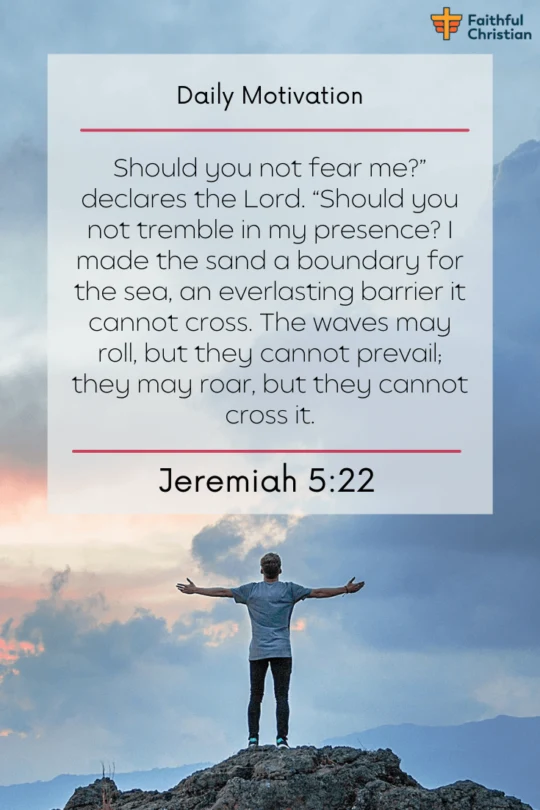
Should you not fear me?” declares the Lord.
“Should you not tremble in my presence?
I made the sand a boundary for the sea,
an everlasting barrier it cannot cross.
The waves may roll, but they cannot prevail;
they may roar, but they cannot cross it.
In Jeremiah 5:22, we’re shown a picture of God’s profound might. “Fear ye not me? saith the Lord…” Here, God declares His control over the seas and establishes limits.
His authority is beyond dispute, forming boundaries that keep chaos at bay. This idea provides a sense of tranquility and stability in our lives.
Like the Israelites during their wilderness journey, we often face turmoil. Yet, God’s guidance brought them eventual peace. He set boundaries, ensuring their safe journey to the Promised Land.
When we comprehend this divine control, peace floods our hearts. We understand that the same God who guided the Israelites is present in our lives, offering tranquility amid chaos.
Reflecting on the creation narrative in Genesis 1:9-10, we see God’s command over the dry land and seas. Similarly, in Job 38:8-11, God limits the sea, establishing His supreme control.
Both passages affirm His peace-keeping power. Personally, I find solace in this divine order. It’s a testament to peace within potential chaos.
Lastly, consider a modern society that enforces fair laws and regulations. Though at times it may seem restrictive, we find peace in these boundaries.
They provide structure, deter chaos, and allow for the smooth running of our communities. Much like these societal laws, God’s boundaries in our lives work to bring peace.
In summary, recognizing God’s might profoundly impacts our personal peace. God, who tames the sea and guided the Israelites, is capable of stilling life’s storms. This knowledge reassures us we are not alone in navigating life’s sea.
A peace-giving God sets boundaries, ensuring chaos doesn’t overflow. Therefore, I can confidently proclaim, “Peace, be still.”
Job 38:11
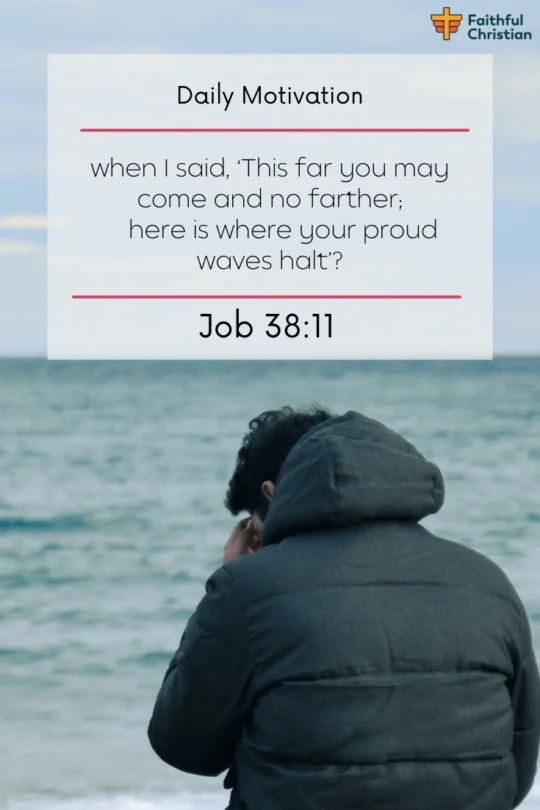
when I said, ‘This far you may come and no farther;
here is where your proud waves halt’?
In Job 38:11, God declares, “This far you may come and no farther.” It’s a powerful testament to His command over the sea, symbolizing His control over chaos. This control, in essence, brings peace, and it offers a compelling analogy for life’s tumultuous journey.
Life can feel like a stormy sea. Yet, the words of Job 38:11 reassure us. If God can halt the sea’s proud waves, He can quiet life’s turbulence. Job found tranquility in this truth, recognizing God’s control amidst his trials.
His story tells us that understanding our boundaries, accepting what’s within our power, and acknowledging divine sovereignty can bring peace.
Now, let’s ground this in a real-world context. Picture an entrepreneur embarking on a new venture. They face uncertainties: a volatile market, stiff competition, financial strain. This scenario mirrors a stormy sea.
But peace can still flourish here. Like Job, the entrepreneur can find calm by acknowledging what’s within their control. The boundaries they respect can be the source of their peace.
Job 38:11 isn’t merely about divine power. It’s a lesson in recognizing boundaries. This recognition allows for peace amidst chaos. It reminds us to focus on our domain, understanding what we can and can’t control. This perspective helps create a tranquil mental space.
I take comfort in this. Our peace is rooted not in calm seas, but in knowing who controls the storm. The divine boundary setter. The controller of chaos. The stiller of seas. By accepting this, we unlock a peaceful life, a life where our “proud waves” halt at divine command.
So, the next time you’re amid a storm, recall Job 38:11. It’s a verse that infuses peace into chaos. Peace, be still.
Let this divine promise guide you through life’s turbulent seas, securing your peace, as it did for Job and can do for all of us.
Psalm 93:3-4
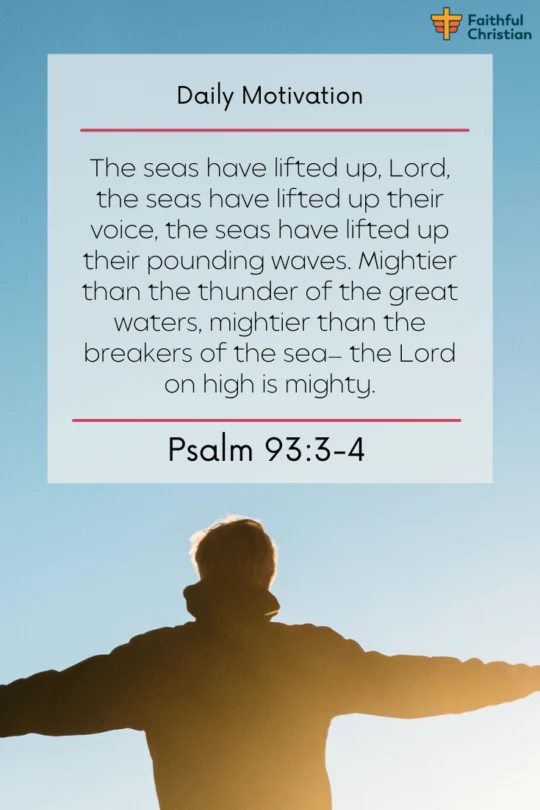
The seas have lifted up, Lord,
the seas have lifted up their voice,the seas have lifted up their pounding waves.
4 Mightier than the thunder of the great waters,
mightier than the breakers of the sea—
the Lord on high is mighty.
Picture a powerful ocean storm. The waves rise and roar, demonstrating their might. Now, imagine a voice even stronger. A voice that hushes the wild waves with one command. That’s what Psalm 93:3-4 paints for us.
“These stormy waves, they shout, they thunder. Yet, the voice of the Lord is mightier,” it says. Here, we see life’s tumults symbolized as surging waves. We often face these in the form of personal challenges or community conflicts.
God’s voice, however, pierces through the disorder. It’s a voice of authority, the one that initiated the universe. It’s also a reassuring voice, offering tranquility amidst life’s trials. Isaiah 43:2 echoes this sentiment, “When you pass through waters, I will be with you.”
Think of David, who grappled with numerous ‘storms’. Pursued by King Saul, experiencing loss, and confronting personal failings – David faced it all.
Amidst the turbulence, he discovered a profound peace. His secret? Trusting God’s strength. This trust offers personal tranquility – a lesson for us today.
A real-life parallel can be seen in the life of a soldier. War is chaos – a tumultuous flood if there ever was one. The soldier, much like David, often finds themselves in the eye of the storm.
Yet, many soldiers find a calm center in the midst of war. How? By holding onto their faith and their love for their country and family. This belief, much like the voice of God in Psalm 93, gives them strength and peace.
Psalm 77:16 tells us, “The waters saw you, God. They saw you and trembled.” Even the chaotic waters recognize God’s authority. They yield to His command. His might calms the deepest chaos.
As we wade through our ‘storms’, let’s remember Psalm 93. It’s a reminder of the peace that comes with recognizing God’s might. The chaos in our lives can find tranquility in His strength.
His might surpasses all – even the fiercest of our ‘storms’. His strength can be our peace. As the scripture says, “Mightier than the waves of the sea, the Lord on high is mighty.
Nahum 1:4

He rebukes the sea and dries it up;
he makes all the rivers run dry.
Bashan and Carmel wither
and the blossoms of Lebanon fade.
Nahum 1:4 offers an image of God’s control over nature. His command prompts the seas to dry, the rivers to vanish. This picture can be daunting, but also comforting.
Why? God’s power over natural forces implies His power over our life’s chaos. Just as He stills the seas, He can quell our personal storms. Imagine watching a fierce ocean tempest, suddenly turning tranquil. This is the peace God offers.
Take, for example, the Biblical account of Nineveh. This bustling city was steeped in turmoil and wickedness. God could’ve chosen to destroy it outright. Instead, He sent Jonah to deliver a message of repentance.
The people of Nineveh, from the greatest to the least, humbled themselves and found temporary peace in their repentance. It was a powerful display of God’s authority – not just in quelling physical storms, but societal ones as well.
When we surrender to that authority, as the people of Nineveh did, we find tranquility.
But you might ask, “How does this apply to my life?” It’s a valid question.
Well, consider this: the actions of a single community battling climate change. They recognize the global crisis – the rising seas, the dying rivers. Yet, instead of succumbing to despair, they take a stand.
They implement sustainable practices, doing their part to ‘still’ the environmental chaos. By acknowledging the problem, they are, in effect, recognizing a power greater than themselves, and that leads to a peace that surpasses understanding.
Our perception of God’s power shapes our reactions to life’s turmoil. Psalm 46:3 assures us that we need not fear, even when mountains shake and oceans roar.
God is our refuge and strength. Remembering God’s authority over nature and our lives helps us navigate life’s storms.
In Habakkuk 3:10, mountains witness God’s power and quake. But this awe-inspiring power also brings peace. The ‘mountains’ of problems we face are manageable under His authority.
In conclusion, Nahum 1:4 serves as a reminder of God’s command over nature and our lives. It’s an assurance that, just like He stills the seas, He can also calm our personal chaos.
Acknowledging and submitting to His power brings tranquility. Recognizing His authority, we handle life’s tumult with grace and peace.
Psalm 46:10
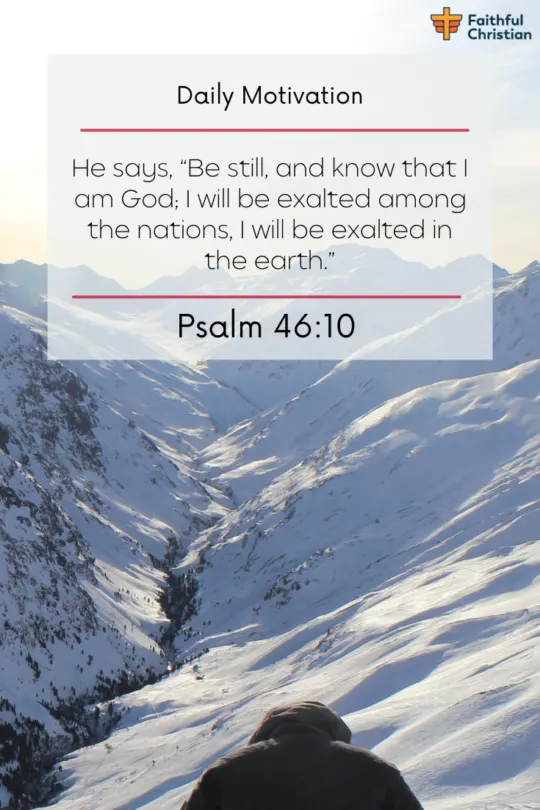
He says, “Be still, and know that I am God;
I will be exalted among the nations,
I will be exalted in the earth.”
Psalm 46:10 is our compass in life’s stormy seas. It guides us towards tranquility, saying, “Be still, and know that I am God.” Let’s dive deeper into this verse.
First, we’re invited to peace. The invitation isn’t to a place but a state of mind. This peace emerges when we recognize God’s sovereignty, as captured in Ezekiel 38:23.
God reveals His greatness to nations, underlining His divine authority. Our challenge? To quiet our hearts and open our minds to His presence.
Consider the story of Elijah, a prophet who had fled from Jezebel and sought God at Mount Horeb. Elijah expected to encounter God in the powerful wind, earthquake, or fire.
But the LORD was not in these mighty demonstrations of nature. Instead, He revealed Himself in a gentle whisper, a still, small voice (1 Kings 19:12).
This revelation underscores the profound truth that God’s peace often dawns in moments of silence and solitude. When we silence our thoughts and quiet our souls, we make room to hear God’s voice, which guides us and imparts peace.
Third, silence plays a key role in spiritual growth. Amid the world’s chaos, finding quiet moments is crucial. If we’re perpetually entangled in worldly worries, we might miss the serenity offered by God.
I know someone who was enveloped in stress due to their demanding job. But they found solace in mindfulness and meditation. By embracing quiet moments, they let go of their worries and found inner peace.
Finally, let’s ponder the contrast between worldly chaos and divine peace. Our world often whirls with noise and disorder, but Psalm 46:10 invites us to step into God’s quietude. It teaches us that peace isn’t an external condition but an internal state.
Many find transformation in the concept of ‘letting go and letting God.’ They discover peace isn’t about controlling life’s storms, but about knowing the One who can.
So, let’s embrace the wisdom of Psalm 46:10. Let’s ‘be still,’ and find peace in knowing the One who stills life’s storms.
More scriptures about peace be still
Psalm 100:3 (NIV)
Habakkuk 2:20 (NIV)
Zechariah 2:13 (NIV)
Psalm 83:18 (NIV)
John 14:27 (NIV)
Philippians 4:7 (NIV)
Isaiah 41:10 (NIV)
Isaiah 26:3 (NIV)
John 16:33 (NIV)
Proverbs 3:5-6 (NIV)
Philippians 4:6-7 (NIV)
1 Peter 5:7 (NIV)
Jeremiah 33:3 (NIV)
Psalm 119:165 (NIV)
1 John 2:10 (NIV)
Recommended for you
- A powerful prayer for peace
- Prayer for peace & Unity in the world
- 25 Bible verses about Peace of mind in tough times
- Peace and Comfort: 31 Powerful Scriptures.
Final words of encouragement
The scriptures were written to enlighten our souls and strengthen our faith in God.
No matter what you are going through, it would be best to depend on the scriptures for encouragement.
1. Faith is a critical tool
In our trials, we must build up our faith in God.
The way we face our battles depends on how much faith we have.
Faith is the ability to trust in God even in impossible situations.
Paul, the apostle of Christ, describes faith as, “Now faith is the substance of things hoped for, the evidence of things not seen.” (Hebrews 11:1)
One easy way to improve your faith is by studying the scripture and listening to the word of God.
The scriptures say, “So then faith comes by hearing, and hearing by the word of God” (Romans 10:17).
In trying times, we can depend on God through our faith.
That’s exactly what happened on the ship.
While Christ was sleeping unconcerned about the wave, his disciples, with little faith, were panicking.
When there is faith, everything is calm.
2. You will face tribulations
Don’t get deceived about a life without sorrow and pain.
They will come, and it is inevitable.
We must all face trials, persecutions, and pain.
There is no hiding place from the devil and his wicked agents.
But in all, God will protect us and shield us from the wicked.
The storm symbolizes persecution that will definitely arise in our lives.
It could come in any way or form.
It could be sicknesses, disappointments, joblessness, physical pain, accidents, physical abuse, or poverty.
Whatever the case, we must trust in God.
3. Don’t be afraid to call on the name of God
Since persecutions are inevitable, we must prepare for them.
We must call for help from our maker and our savior.
There is no reason to feel ashamed of your situation.
We all have our shortcomings and trials.
The disciples should have been more confident in Christ.
With the miracles they have seen firsthand, they should have been more faithful.
Yet, when faced with a storm, they quickly ran to Christ for help.
In other words, they trusted in Christ to save them.
4. Quiet, be still because God answers prayers
Numerous passages in the scriptures show God answers prayers.
He listens to our requests and answers them.
When you are faced with a problem, get on your knees, and pray to God.
Don’t wait, doing nothing.
You will lose nothing from praying to God.
May God calm your troubles and return peace to the darkest part of your heart. Amen.
Frequently Asked Questions
How to be still before God?
“Being still before God” means finding quiet moments to focus on His presence. This calm state often comes through prayer, reading Scripture, or just being in silence.
In the Bible, Psalm 46:10 tells us to “Be still, and know that I am God.” Here, stillness doesn’t mean inactivity. It means giving God space to work in our lives, acknowledging His control over everything.
What is the spiritual meaning of peace?
In spiritual terms, “peace” isn’t just an absence of conflict. It’s a state of wholeness, well-being, and tranquility that comes from a deep connection with God.
Philippians 4:7 in the Bible says, “And the peace of God, which transcends all understanding, will guard your hearts and your minds in Christ Jesus.” This peace, unlike the world’s understanding of it, is a divine gift.
What did Jesus mean when he said peace be with you?
When Jesus said, “Peace be with you,” he was offering a unique kind of peace to His followers.
According to John 20:19 in the Bible, this peace means freedom from sin, love from God, and assurance of eternal life. His words offered comfort and reassurance in times of fear and uncertainty.
What Scripture says peace be still and know that I am God?
The phrase “Peace, be still” is found in Mark 4:39 of the Bible. Here, Jesus calms a storm, demonstrating His authority over nature.
This command has since become a metaphor for Christians to invite peace and order into their own lives during chaotic times.
What is the biblical meaning of be still?
Being still” in the Bible means more than not moving. It means quieting our minds to listen to God and trusting in His wisdom.
Psalm 46:10, “Be still, and know that I am God,” suggests that a calm spirit can better recognize and seek God’s guidance.
Where did peace be still come from?
The phrase “Peace, be still” originates from the Bible, in the Gospel of Mark 4:39. Jesus uses these words to miraculously calm a violent storm, reinforcing the idea that God can bring order to chaos.
What’s the meaning of peace be still?
The term “Peace, be still” is interpreted as an end to disorder and the start of tranquility. It symbolizes God’s ability to bring peace into our personal storms – our worries, fears, and problems.
What is the “peace, be still” prayer?
The “Peace, be still” prayer is a call for God to bring calm and order to our troubles. This prayer can be as simple as reciting “Peace, be still,” expressing faith that God hears us and will bring peace into our lives.

Chester olson
Monday 3rd of January 2022
Thankyou,this blessed me today.